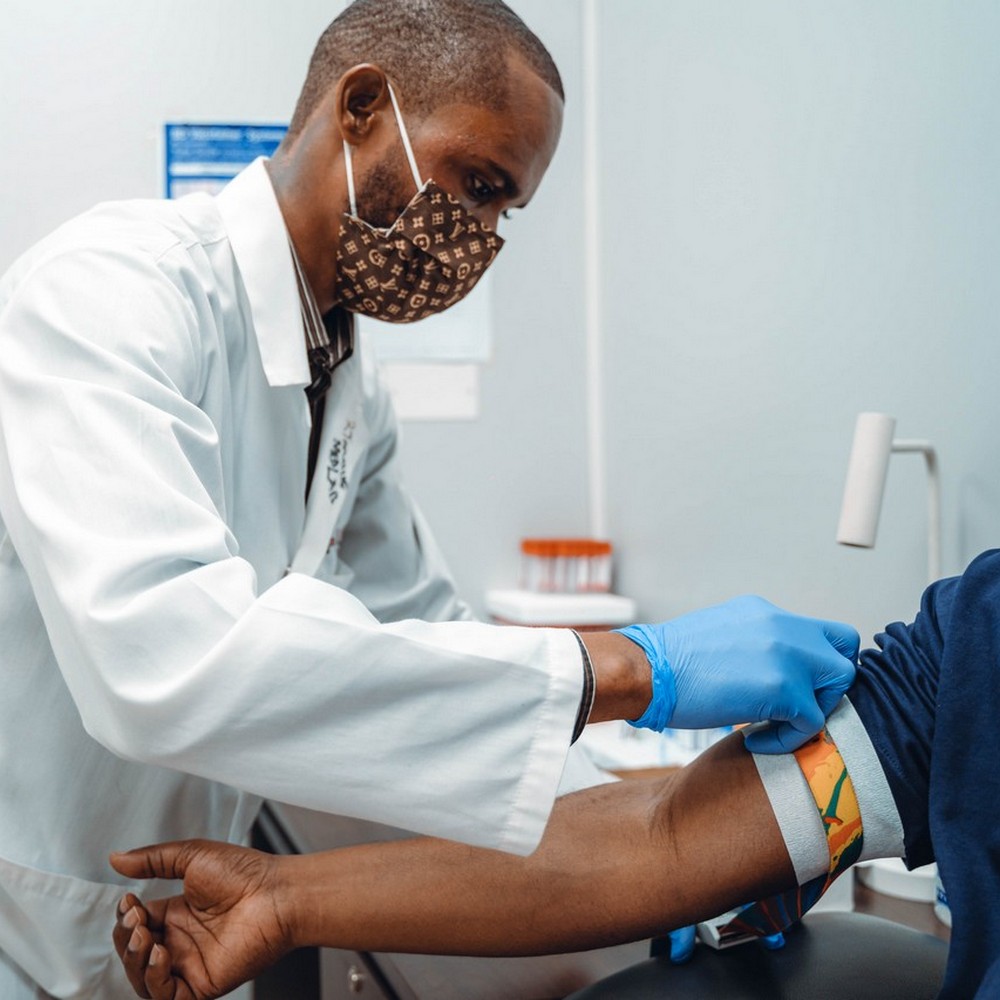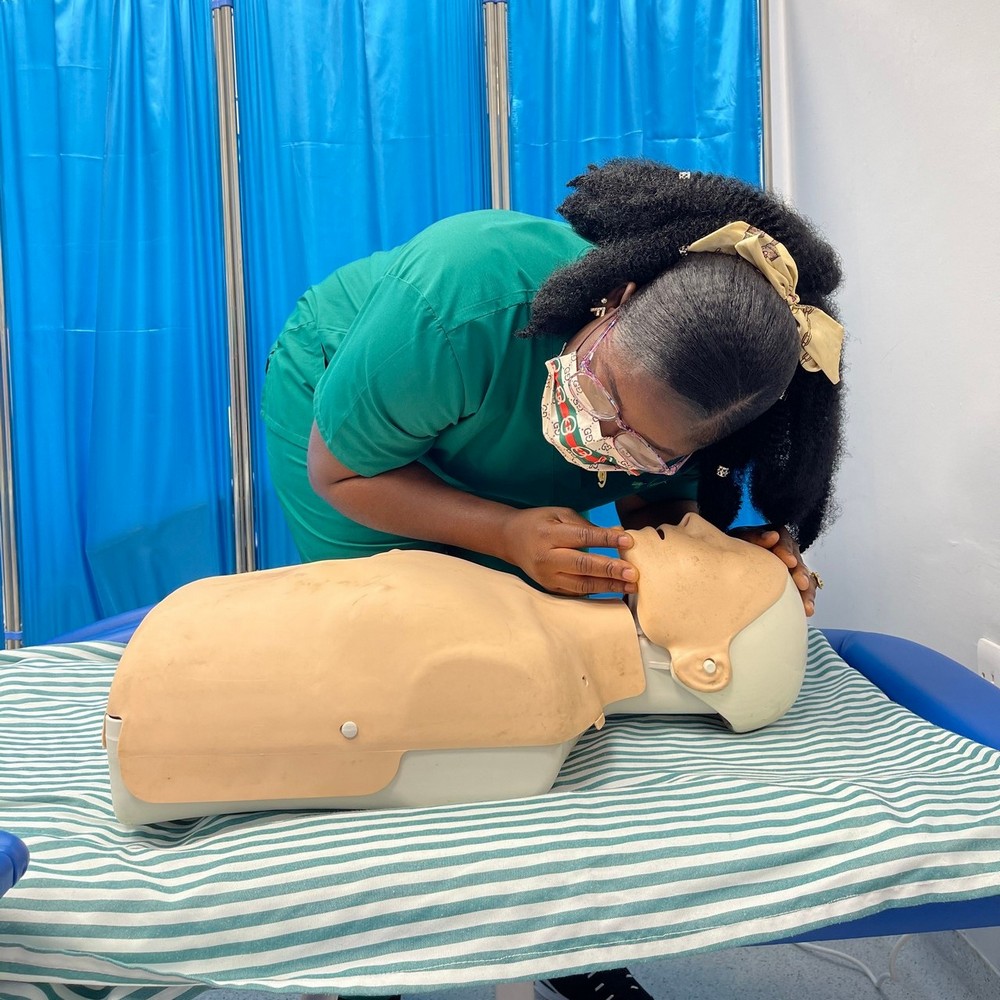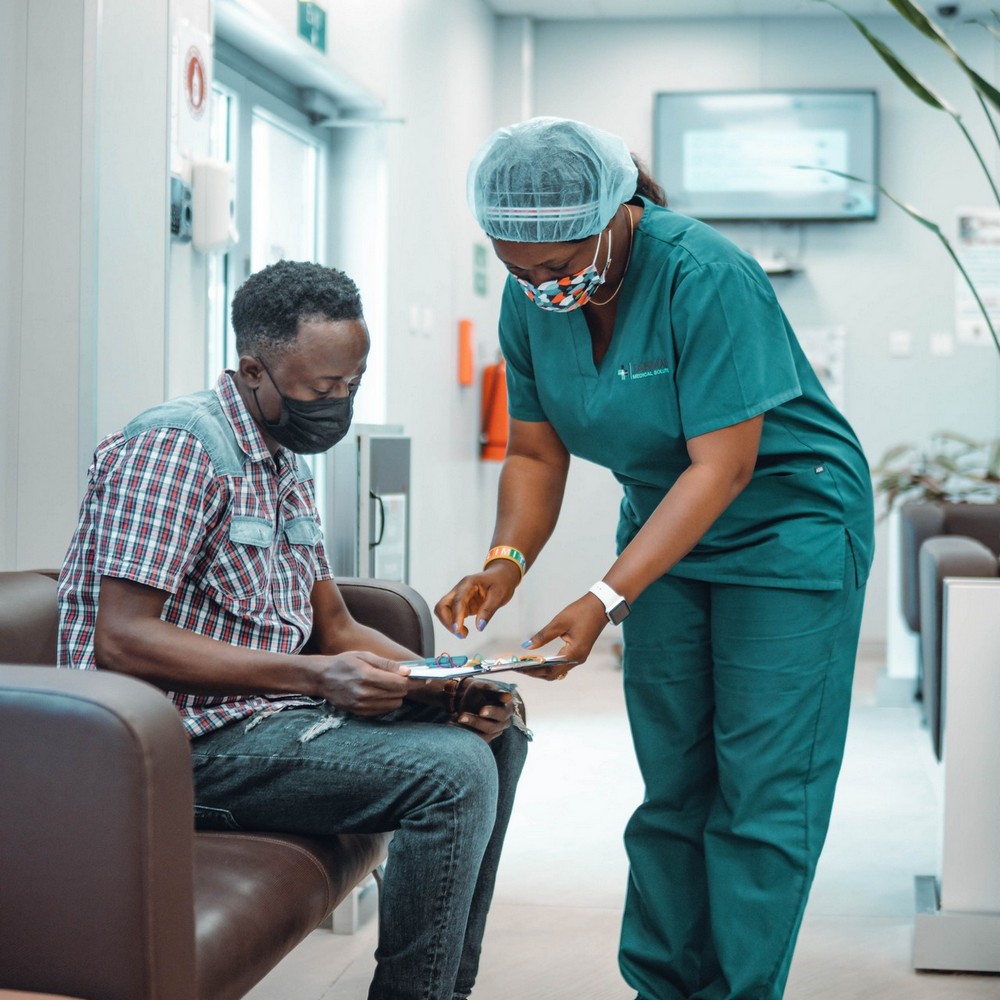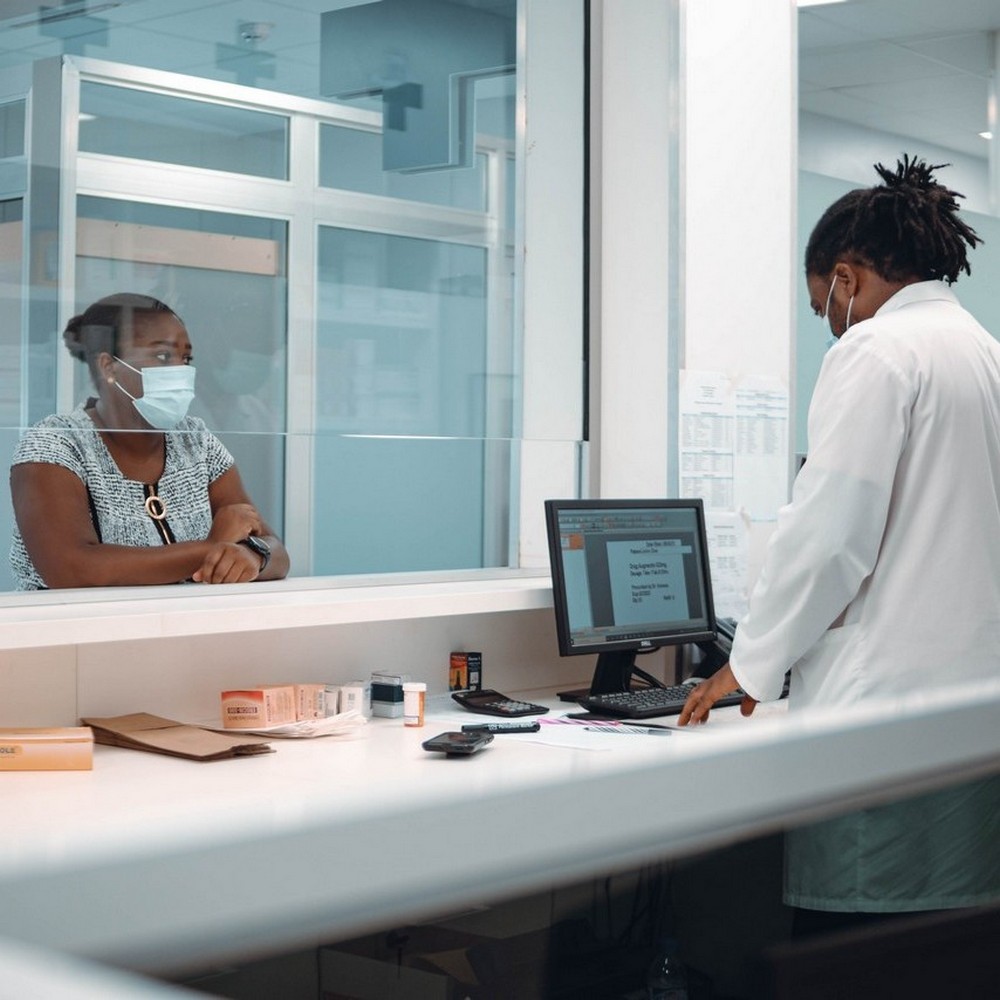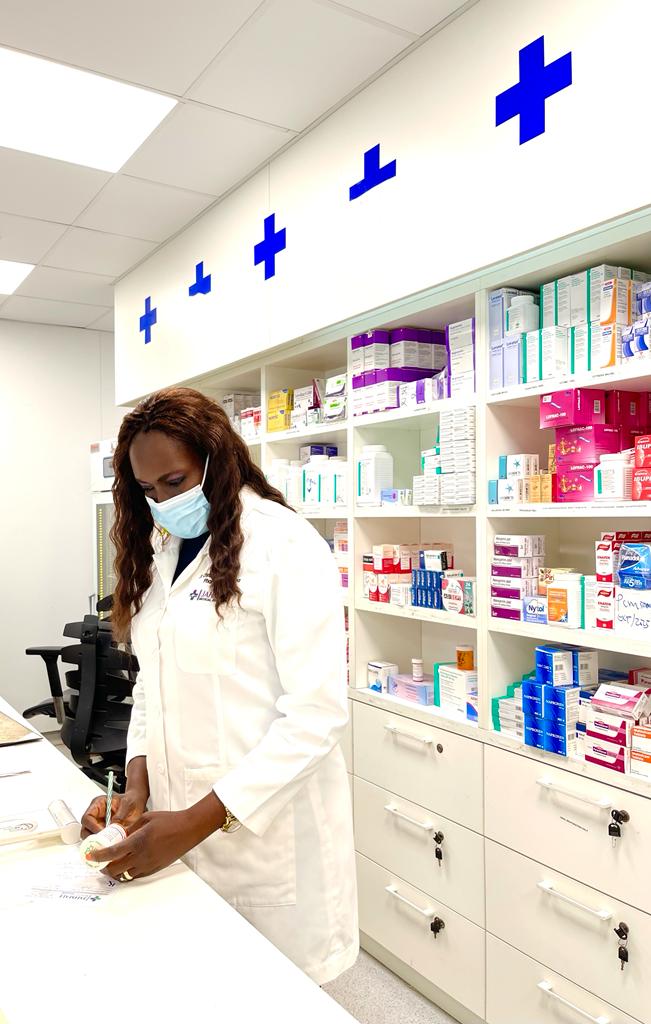List Navigation
General Practice (GP)
General practitioners (GPs) treat all common medical conditions in children and adults and refer patients to hospitals for urgent and specialist treatment. They focus on the health of the whole person combining physical, psychological and social aspects of care.
Your GP is your first point of contact for non-emergency and preventative medical care during clinic hours. GPs are trained in medicine and are qualified to treat people for general health problems, such as illnesses or injuries that cannot be treated by over-the-counter medication. Some GPs specialize in particular areas, such as children’s health or aged care.
Your health matters at Jahmale. Therefore, we encourage patients to develop an ongoing relationship with their GP, as it is often the most effective way of managing your healthcare. They will get to know you over time and become familiar with your medical history. As a reliable member of your family, we are committed to providing an environment that promotes trust and comfort.
Schedule an appointment with a General Practitioner now
What Does a General Practitioner Do?
If you’re seeking treatment for a physical or mental health concern, a general practitioner is likely your first point of contact. They help everyone from newborns to older adults. GP consultations can ensure you are up to date on all immunizations, provide wound care, some mental health, dietary and family planning advice.
General practitioner duties include assessing you with a physical exam and a review of your medical history. From there, they may order additional tests, recommend treatment, or connect you with a specialist. As a vital component of Jahmale, General Practitioner consultations are available throughout of operational hours.
What to Expect at the during your appointment with a General Practitioner?
What happens when you go to a GP will depend upon your reason for scheduling the appointment. Still, you can probably expect these steps in care.
- Before any tests or treatment, your doctor will listen to your expectations, objectives and answer any questions you may have.
- Discuss your medical history. You will be asked about your family health history, previous conditions and the severity of their symptoms, your diet, health habits and so forth.
- Assess your health. This may require a physical assessment of you to further understand your initial complaint.
- Run diagnostic tests.
- Develop a treatment plan.
- Advise you about lifestyle changes, if necessary.
- Provide you thorough information about your condition and treatment plan.
- Prescribe medication, where necessary.
Internal Medicine
Internal Medicine
Internal Medicine is the medical specialty that concentrates on the care of adult patients. Doctors specializing in Internal Medicine are known as Internists. They have the scientific knowledge and clinical expertise to prevent, diagnose, treat, and provide compassionate care of adults across the spectrum from health to complex illness.
Internists are often considered when choosing a primary care physician. At Jahmale Medical Solutions, Internist are involved in the diagnosis and management of patients with complex medical issues within the scope of general internal medicine and more focused areas (often called a ‘sub-specialty’) such as Cardiology (heart & cardiovascular system), Gastroenterology & Hepatology (gastrointestinal system, liver & gall bladder), Medical Oncology (cancer & blood), Nephrology (kidneys), Neurology (nervous system, brain & spine), Respiratory Medicine (lungs) etc.
While you may opt for an internist, general practitioners are also available as an option for primary care. Both can treat a wide spectrum of conditions. Internists have a great depth of knowledge about adult health issues, while General Practitioners treat children as well as adults.
Schedule an appointment with an Internist now
What to Expect during your Internal Medicine Consultation?
What happens when you go to an internist will depend upon your reason for scheduling the appointment. Still, you can probably expect these steps in care.
Before any tests or treatment, your doctor will listen to your expectations and objectives and answer any questions you may have. You will be asked about your family health history, previous conditions and the severity of their symptoms, your diet, health habits and so forth. If necessary, your internist may require a physical assessment of you to further understand your initial complaint. Your internist will then order tests based on your complaint and the answers you provided and develop a management plan to best treat the findings.
What are some of the common illnesses Internist at Jahmale Treat?
Internist at Jahmale work to prevent, diagnose and manage the following
- Diseases of the Heart and Blood Vessels
- Diseases of the Endocrine System (i.e. Diabetes and other related diseases)
- Diseases of the Kidneys and related organs
- Diseases of the Digestive system (Stomach, Liver, and other related organs)
- Diseases of the Lungs and related organs
- Blood Diseases including Anemia, Sickle Cell Disease, etc.
- Initial screening and evaluation for various Cancers
- Infectious Diseases (Including HIV, Hepatitis, and other STIs)
- Non-Surgical procedures of the Ear Nose and Throat (ENT)
- Diseases of the Skin
- Allergy/Immunology and Diseases of the Bones and Joints
While preventing the development of any illness is the main objective for any physician, it is not always the case. Patients don’t always follow the plan of care prescribed by their doctor. If you have any concerns speak to your doctor so that they may be addressed and a change of plan may be initiated if necessary.
How to prepare for a typical internal medicine appointment?
Regardless of why exactly you want to see an internist, you need to have a rough idea of what the appointment requires so that you can prepare for it. These preparation tips will help you make the most of your upcoming appointment with your internist:
Tip #1 – Try to relax. It’s natural to be nervous or anxious when visiting a healthcare provider, but remember that they are here to try to help you. Try to relax as much as possible (some patients even suffer from white-coat hypertension, which means their blood pressure actually rises higher than normal when they are in the provider’s office). When you arrive or sign on, take a few deep breaths and remember that your provider is on your get-well and stay-well team. Also, remember that arriving early for your appointment will usually allow you to sit quietly for a few moments to center yourself.
Tip #2 – Be honest with your provider. Let’s be honest — many medical conditions are uncomfortable to discuss, especially in-person. But you should not feel embarrassed or ashamed to talk about anything with your provider. (Trust us, providers have heard it all!) Actually, leaving out details or lying to your provider can be bad for your health because it affects your care, so tell your provider everything. Honesty is definitely the best policy — especially for your health.
Tip #3 – Be prepared. Prepare a list of questions you would like the doctor to answer. This will make the appointment quick and easy as you will have all your important question in one place and in the right order. Have a copy of the list of all the medications you’re taking or have been taking recently. This is in fact a requisite for most doctor’s appointments. Your internist has to know about your current medications before prescribing any other treatment to you.
Tip #4 – Know your family medical history. Ask your parents and siblings the following questions. Have you been diagnosed with any chronic disease? What are the alarming health conditions? Do you have heart-related problems, diabetes, hypertension, anything associated with mental health illnesses, etc.?
Orthopedics
Orthopedics at Jahmale
What do orthopedic doctors do?
Orthopedic doctors, often referred to as orthopedic surgeons, focus on helping you with musculoskeletal issues. Their duties include:
- Diagnosing and treating conditions that affect your musculoskeletal system including trauma and congenital deformities.
- Assisting with rehabilitation, which helps you regain movement, strength, range of motion, and flexibility following an injury or surgery
- Forming strategies to prevent injury or to keep chronic conditions, such as arthritis, from worsening
While orthopedic doctors know about all parts of the musculoskeletal system, some choose to specialize further. Some subspecialty areas of orthopedics include:
- Spine
- Pediatric orthopedics
- Hip and knee
- Hand
- Shoulder and elbow
- Foot and ankle
- Sports medicine
- Trauma surgery
What to Expect During an Appointment?
During your first orthopedic appointment, your physician gathers your medical history. They speak to you about any symptoms you’re experiencing. Next, the orthopedist will take a series of X-rays, blood tests, and other examinations. These medical tests help the physician assess the current state of your physical health.
The specialist will conduct a lifestyle assessment. He or she will ask questions about your current activities, diet, and occupational duties. If necessary, the will doctor advise you to adjust activities that may aggravate your health condition. Your doctor will prescribe a treatment plan after assessing your injury.
What types of procedures do they do?
Orthopedic doctors recommend a variety of treatments and procedures for the conditions they handle.
Nonsurgical treatments
These types of treatments are also called conservative treatments. Orthopedic doctors will often focus on nonsurgical treatments first before recommending surgery. Some types of nonsurgical treatments include:
- Your orthopedic doctor may recommend specific exercises or stretches to help maintain or improve your strength, flexibility, and range of motion in a particular area.
- Sometimes preventing additional strain to an area can help it to heal. Examples of immobilization techniques include braces, splints, and casts.
- Your orthopedic doctor may recommend medications to help relieve symptoms like pain and swelling. They may also prescribe certain prescription drugs like corticosteroids and anti-inflammatory medicine.
- Lifestyle changes. Your orthopedic doctor may also help you with making lifestyle changes. These can involve modifying your physical activity, diet, and the ways you exercise to prevent aggravation of an injury or condition.
How to prepare for a typical orthopedic consultation appointment?
Regardless of why exactly you want to see an orthopedic surgeon, you need to have a rough idea of what the appointment requires so that you can prepare for it. These preparation tips will help you make the most of your upcoming appointment with your orthopedic surgeon:
Tip #1 – Try to relax. It’s natural to be nervous or anxious when visiting a healthcare provider, but remember that they are here to try to help you. Try to relax as much as possible (some patients even suffer from white-coat hypertension, which means their blood pressure actually rises higher than normal when they are in the provider’s office). When you arrive or sign on, take a few deep breaths and remember that your provider is on your get-well and stay-well team. Also, remember that arriving early for your appointment will usually allow you to sit quietly for a few moments to center yourself.
Tip #2 – Be honest with your provider. Let’s be honest — many medical conditions are uncomfortable to discuss, especially in-person. But you should not feel embarrassed or ashamed to talk about anything with your provider. (Trust us, providers have heard it all!) Actually, leaving out details or lying to your provider can be bad for your health because it affects your care, so tell your provider everything. Honesty is definitely the best policy — especially for your health.
Tip #3 – Be prepared. Prepare a list of questions you would like the doctor to answer. This will make the appointment quick and easy as you will have all your important question in one place and in the right order. Have a copy of the list of all the medications you’re taking or have been taking recently. This is in fact a perquisite for most doctor’s appointments.
Tip #4 – Know your family medical history. Ask your parents and siblings the following questions. Have you been diagnosed with any chronic disease? What are the alarming health conditions? Do you have heart-related problems, diabetes, hypertension, anything associated with mental health illnesses, etc.?
OBGYN
A Gynecologist specialist at Jahmale handle your well-women routine care services, provide preconception, antenatal and postnatal care, treat for conditions of the female reproductive system and provide ongoing care for women’s issues. Our gynecologist can also help to manage your overall health. For most women, an OBGYN is a primary care provider. This is the first person most of these women see when they have any health problem.
At Jahmale Medical Solutions our OB/GYN specialists are known for their experience and respectful approach to pregnancy care and women’s healthcare. They use the latest guidelines and methods, so you can trust you are receiving the highest level of OB/GYN care. Our team also includes certified nurses.
Our OB/GYN specialists see patients for all obstetric and gynecological conditions, including:
- Abnormal uterine bleeding
- Infertility
- Menopause
- Pelvic pain
- Postpartum care
- Pregnancy
- Uterine Fibroids
- Vaginal infections
Schedule an appointment with a gynecologist now
Reasons you might see a gynecologist?
You may make an appointment or get a referral to a gynecologist:
- You’re planning to become pregnant or are pregnant.
- You’re due for your yearly well-woman exam.
- You have pelvic pain, menstrual irregularities, abnormal vaginal discharges or urinary problems.
- You are experiencing symptoms of peri-menopause or menopause including hot flushes, mood swings etc.
- You have any other concerning symptoms affecting the pelvic or vaginal.
It’s a good idea to see an OB/GYN specialist before you’re pregnant to ensure the healthiest pregnancy possible.
If you are pregnant, make the appointment as soon as you find out. Most women won’t need to visit until they are around eight weeks pregnant.
What you can expect during your visit to a gynecologist?
When you make an appointment with a Gynecologist, or when your primary care provider refers you to a Gynecologist, be prepared to discuss why you’re there. It may help for you to bring a list of questions or symptoms related to why you made the appointment. You should also be prepared to answer questions about your medical history and any medications you might be taking. Because ob-gyns deal with such personal and sensitive health issues, the thought of seeing one, especially for the first time, may be troubling to some women. You might be nervous or embarrassed at having a doctor see the most private parts of your body. Or you may be reluctant to discuss your most intimate issues with an ob-gyn.
How to prepare for a typical Gynecologist appointment?
Regardless of why exactly you want to see a Gynecologist, you need to have a rough idea of what the appointment requires so that you can prepare for it. These preparation tips will help you make the most of your upcoming appointment with your OBGYN doctor.
Tip #1 – Try to relax. It’s natural to be nervous or anxious when visiting a healthcare provider, but remember that they are here to try to help you. Try to relax as much as possible (some patients even suffer from white-coat hypertension, which means their blood pressure actually rises higher than normal when they are in the provider’s office). When you arrive or sign on, take a few deep breaths and remember that your provider is on your get-well and stay-well team. Also, remember that arriving early for your appointment will usually allow you to sit quietly for a few moments to center yourself.
Tip #2 – Be honest with your provider. Let’s be honest — many medical conditions are uncomfortable to discuss, especially in-person. But you should not feel embarrassed or ashamed to talk about anything with your provider. (Trust us, providers have heard it all!) Actually, leaving out details or lying to your provider can be bad for your health because it affects your care, so tell your provider everything. Honesty is definitely the best policy — especially for your health.
Tip #3 – Be prepared. Prepare a list of questions you would like the doctor to answer. This will make the appointment quick and easy as you will have all your important question in one place and in the right order. Have a copy of the list of all the medications you’re taking or have been taking recently. This is in fact a requisite for most doctor’s appointments. Your internist has to know about your current medications before prescribing any other treatment to you.
Tip #4 – Know your family medical history. Ask your parents and siblings the following questions. Have you been diagnosed with any chronic disease? What are the alarming health conditions? Do you have heart-related problems, diabetes, hypertension, anything associated with mental health illnesses, etc.?
Tip #5- Try to keep a record of your menstrual history (you can use your smart phone, or dairy, etc), contraceptive history as well as any screening history for cervical cancer, breast cancer, etc.
Pediatrics
Jahmale Medical Solutions is committed to being a trusted member of your family. On days when your child is healthy, sick, and for any health needs in between, the pediatricians and pediatric nurses at Jahmale are here for you and your family.
By choosing Jahmale Medical Solutions, you have access to medical professionals that are passionate about you, your health and your wellness. We are committed to providing the best care for your children and follow the most up-to-date evidence based national and international recommendations to provide comprehensive pediatric care for your child.
Because your child’s health matters at Jahmale, our goal is to offer the best care to your family along every step of your child’s growth and development. Providing you with the nation’s best pediatricians, at the its most advanced clinic, Jahmale offers well child visits, online tools and wellness guides for parents and families.
Well child visits are vital in the promotion of the physical, mental, and social health and development of infants, children, adolescents, and young adults.
Regular well child visits help parents, children and physicians:
- Identify and address concerns of parents and patients
- Identify and address possible concerns in the child’s environment that may affect parenting and the child’s well-being
- Identify and address developmental, behavioral, and health concerns that are identified through measurements, screens, tests, history, and physical examination at the visit
- Follow up on prior concerns and ongoing conditions
- Provide information, guidance and resources
However, one of the most important purposes of well-child visit is to develop a trusting and caring relationship between parents, children, and their health care team.
What happens at a well-child appointment?
Based on your child’s age, we may perform screening tests, such as blood tests or hearing and vision tests, to look for potential problems. Your child’s growth and vital signs will be obtained and evaluated. Your child’s physician will perform a thorough history and physical examination. Any concerns identified through the above processes will be addressed. A personalized plan of care and follow-up will be created between you and your child’s health care provider
Please plan for 60-90 minutes at our office for each well child visit.
Patients age 18 and under must be accompanied by a parent or guardian. Due to our COVID-19 restrictions, we are restricting unnecessary visitors onsite including those accompanying minor patient. You can prepare for this by designating one person ahead of your child’s visit. Exceptions will only be made if both parents are present.
Well-child visits are scheduled to take place at the following ages:
- Birth (1-3 days after discharge from the hospital)
- 2 weeks to 4 weeks
- 2 months
- 4 months
- 6 months
- 9 months
- 12 months
- 14 months
- 18 months
- 24 months
- 30 months
- 3 years
- Yearly from 4-18 years
Well child visits are often also scheduled to comply with school and/or sports physical requirements for school-aged children.
Appointment Cancellation or Late Arrivals
In an effort to serve our patients by making best use of our available appointment slots, Jahmale request a 24-hour prior notice of cancellation of any appointment for which the patient is unable to attend.
We make every effort to be on time for all our appointments. Unfortunately, when even one patient arrives late, it can throw off the entire schedule for that session. Out of respect for you and our other patients, we work hard to avoid rushing or “squeezing in” an appointment in order to ensure you get the quality of care you deserve. Patients arriving more than 15 minutes late for a scheduled well visit or office visit appointment may be asked to reschedule for another day. We apologize for any inconvenience this might cause.
Vaccines
It is important that your child gets the necessary vaccines as it is vital for their immunity towards preventable diseases, including early symptoms. We have created a hybrid vaccine schedule for children that are visiting Liberia and also for parents who need to vaccinate their children beyond 9 months. The following vaccines are available to you: PENTA(Hepatitis B, Haemophilus influnzae, DTaP(tetanus, diphtheria, pertussis), Polio(OPV-oral poliovirus vaccine, IPV-inactivated poliovirus vaccine), Rotavirus, MMR(measles, mumps, rubella), Hepatitis A, Meningococcal(Meningitis ACWY), Varicella, PCV-13(pneumococcal), yellow fever, typhoid.
Transitioning Teens to Adult Care
As your child approaches adolescent and teen years, we will work with your teenager to assume more responsibility for his or her own healthcare. While a parent or guardian is required to accompany all patients age 18 and younger to appointments, your child will be encouraged to meet with the physician without a parent present for the majority of the visit starting with his or her 13-year check-up. Parents will be asked to fill out a comprehensive questionnaire about their teenager and will have an opportunity to discuss major concerns with the physician; however, the majority of the visit will be conducted without the parent present. Based on a specific child’s needs, on occasion, there may be exceptions to this plan. Additionally, teenagers will always have the option of requesting a nurse to be in the room.
It is important to empower your child with the confidence and experience they will need once they become an adult and are responsible for managing their own healthcare. You can help them by empowering your adolescent or teen child to know and to understand their own pertinent medical and family history. We encourage you to inform and educate them about their chronic medical conditions, any medications (including vitamins and supplements) they are taking, and any allergies they may have. Being able to manage one’s own health care as an adolescent is an important step in the process of eventually transferring to adult-centered care.
Urology
A urologist is a doctor who specializes in diagnosing and treating diseases of the urinary system. This system keeps the body clean by filtering out wastes and toxins and taking them out of the body. The urinary tract includes:
- Bladder.
- Kidneys.
- Ureters.
- Urethra.
A urologist also treats conditions involving the reproductive organs and the adrenal glands. The adrenal glands are located on top of the kidneys. The reproductive systems of males and females are linked closely to their urinary systems. You might hear someone use the word “genitourinary.” This refers to symptoms, conditions or treatments that affect both systems.
Reasons you might see a urologist
You may make an appointment or get a referral to a urologist if you have:
- Trouble urinating (peeing), including getting started or having a strong flow of urine, pain, cloudy urine or blood in the urine.
- Changes in urination, like frequent urination or feeling like you always have to go.
- Trouble getting or keeping an erection.
- A feeling that something is falling down into your vagina or heaviness in that area.
- Pelvic pain.
- Urinating when you don’t want to, like at night or when you sneeze, laugh or exercise.
What you can expect during your visit to a urologist?
When you make an appointment with a urologist, or when your primary care provider refers you to a urologist, be prepared to discuss why you’re there. It may help for you to bring a list of questions or symptoms related to why you made the appointment. You should also be prepared to answer questions about your medical history and any medications you might be taking.
Your urologist is likely to order tests to diagnose your condition and to determine the best way to treat it.
Some of these tests may include:
- Physical examination. These will be different for males and females. If you’re a man, your doctor may do a rectal exam. If you’re a woman, you may need to have a pelvic exam.
- Urinalysis, blood tests and semen samples. For these tests, you provide samples of your urine, blood and semen. (You might want to make sure you drink some water before you go to your appointment since you might be asked for a urine sample there.)
- Imaging tests, such as ultrasound or computed tomography (CT) scans.
How to prepare for a typical urology appointment?
Regardless of why exactly you want to see a urologist, you need to have a rough idea of what the appointment requires so that you can prepare for it. These preparation tips will help you make the most of your upcoming appointment with your urologist:
Tip #1 – Try to relax. It’s natural to be nervous or anxious when visiting a healthcare provider, but remember that they are here to try to help you. Try to relax as much as possible (some patients even suffer from white-coat hypertension, which means their blood pressure actually rises higher than normal when they are in the provider’s office). When you arrive or sign on, take a few deep breaths and remember that your provider is on your get-well and stay-well team. Also, remember that arriving early for your appointment will usually allow you to sit quietly for a few moments to center yourself.
Tip #2 – Be honest with your provider. Let’s be honest — many medical conditions are uncomfortable to discuss, especially in-person. But you should not feel embarrassed or ashamed to talk about anything with your provider. (Trust us, providers have heard it all!) Actually, leaving out details or lying to your provider can be bad for your health because it affects your care, so tell your provider everything. Honesty is definitely the best policy — especially for your health.
Tip #3 – Be prepared. Prepare a list of questions you would like the doctor to answer. This will make the appointment quick and easy as you will have all your important question in one place and in the right order. Have a copy of the list of all the medications you’re taking or have been taking recently. This is in fact a requisite for most doctor’s appointments. Your internist has to know about your current medications before prescribing any other treatment to you.
Tip #4 – Know your family medical history. Ask your parents and siblings the following questions. Have you been diagnosed with any chronic disease? What are the alarming health conditions? Do you have heart-related problems, diabetes, hypertension, anything associated with mental health illnesses, etc.?
Neurology
Neurology is the practice of medicine that concentrates on the human brain and nervous system. From higher cognitive disorders (i.e. Alzheimer dementia) to diseases of nerve and muscle (i.e. neuropathies and myopathies). Our neurosurgeons treat patients with complex disorders of the nervous system such as stroke, multiple sclerosis, Parkinson’s disease, epilepsy, headache disorders, infections of the brain and peripheral nervous system.
Reasons you might need to see a Neurosurgeon include:
Meningitis
This is a serious infection of the outer part of your brain or spinal cord. Its symptoms are similar to those of a fever, but they last longer and are more severe. The specific surgical treatment needed for meningitis will depend on whether the infection is viral or bacterial.
Spinal disk herniation
Spinal disks are cushions that sit between your vertebrae. They prevent the bones of your back from rubbing against each other, which causes pain. Herniation occurs when the inner material of a disk swells and pushes through the outer membrane. Serious discomfort can result if spinal disks flatten or rupture. Most surgeries to treat spinal hernias are relatively quick operations that can be done in a single day.
Parkinson’s disease
This condition affects the part of your brain that controls movement. It can cause tremors, balance issues, and other problems. Most people with Parkinson’s disease are treated with medication, but some cases are more complicated. When the disease severely affects your quality of life, a neurosurgeon can implant an electrode that stimulates your brain and provides relief from symptoms.
Epilepsy
This central nervous system disorder causes seizures. There are several surgical procedures that neurosurgeons can use to treat epilepsy, such as laser ablation surgery (removing material via a laser) that targets specific lesions in the brain that cause seizures.
What you can expect during your visit to a Neurosurgeon?
What happens when you go to a neurosurgeon will depend upon your reason for scheduling the appointment. Still, you can probably expect these steps in care.
Before any tests or treatment, your doctor will listen to your expectations and objectives and answer any questions you may have. You will be asked about your family health history, previous conditions and the severity of their symptoms, your diet, health habits and so forth. If necessary, your neurosurgeon may require a physical assessment of you to further understand your initial complaint. Your neurosurgeon will then order tests based on your complaint and the answers you provided and develop a management plan to best treat the findings.
How to prepare for a typical Neurosurgeon appointment?
Regardless of why exactly you want to see a neurosurgeon, you need to have a rough idea of what the appointment requires so that you can prepare for it. These preparation tips will help you make the most of your upcoming appointment with your neurosurgeon:
Tip #1 – Try to relax. It’s natural to be nervous or anxious when visiting a healthcare provider, but remember that they are here to try to help you. Try to relax as much as possible (some patients even suffer from white-coat hypertension, which means their blood pressure actually rises higher than normal when they are in the provider’s office). When you arrive or sign on, take a few deep breaths and remember that your provider is on your get-well and stay-well team. Also, remember that arriving early for your appointment will usually allow you to sit quietly for a few moments to center yourself.
Tip #2 – Be honest with your provider. Let’s be honest — many medical conditions are uncomfortable to discuss, especially in-person. But you should not feel embarrassed or ashamed to talk about anything with your provider. (Trust us, providers have heard it all!) Actually, leaving out details or lying to your provider can be bad for your health because it affects your care, so tell your provider everything. Honesty is definitely the best policy — especially for your health.
Tip #3 – Be prepared. Prepare a list of questions you would like the doctor to answer. This will make the appointment quick and easy as you will have all your important question in one place and in the right order. Have a copy of the list of all the medications you’re taking or have been taking recently. This is in fact a requisite for most doctor’s appointments. Your doctor has to know about your current medications before prescribing any other treatment to you.
Tip #4 – Know your family medical history. Ask your parents and siblings the following questions. Have you been diagnosed with any chronic disease? What are the alarming health conditions? Do you have heart-related problems, diabetes, hypertension, anything associated with mental health illnesses, etc.?
Pharmacy
At Jahmale we are passionate about keeping our patients healthy; which is why our specialty pharmacy offers a wide range of medication, vaccines and healthcare supplies.
Our friendly, knowledgeable licensed Pharmacists and Pharmatechs are always available to provide professional pharmaceutical care and expert advice on how to improve your health, whether you are an in-house patient or a walk-in.
At Jahmale you will always get the very best value for your money. All of our mediation and vaccines – both branded and generic – are sourced from ethically responsible pharmaceutical suppliers in Europe.
We also provide hassle-free convenience from our long opening hours to our discreetly-packaged delivery service. Our pharmacy is open to the general public from 7:30am to 7:30pm on Monday – Friday and on Saturday from 7:30am to 1pm. Our courier service can deliver to your location within Monrovia and its environs.
Contact the pharmacy directly on +231881 603 010 for further information on any our services listed above.
